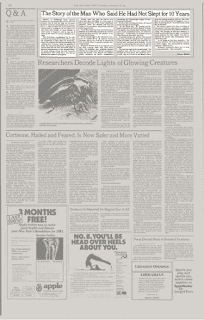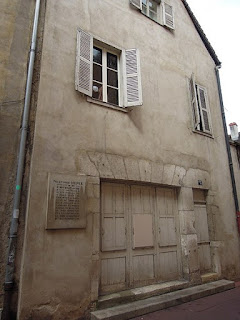THE STORY OF THE MAN WHO SAID HE HAD NOT SLEPT FOR 10 YEARS
Doctors in Edinburgh have recently released the case history details of a man who claimed that he had not slept for 10 years. Since he traced his remarkable story of insomnia to a road accident that had knocked him unconscious for a moment, he was able to collect more than 12,000, or about $28,000, in seven years of litigation, and to stay out of work all the while on various disability pensions.
This insomniac, accompanied by his wife, consulted numerous doctors from 1970 to 1980. He complained to them about his headaches, about the problems he had concentrating and walking and, of course, about his inability to sleep. But the prescriptions for sleeping pills did not help him, he said, and three weeks of physical examinations at the National Hospital found nothing telling. He took extensive psychological tests while there, too, but appeared to be normal in all respects.
Finally, early last year, he and his wife spent four days and nights in a twin room at the sleep laboratory of the Royal Edinburgh Hospital, where Ian Oswald and Kristine Adam of the psychiatry department effected something of a cure.
On the first night that they monitored him at bedtime with electrodes pasted on his head to record his brain activity, the patient, as expected, did not sleep.
On the second night in the laboratory, however, he drifted off for 20 minutes toward morning, and on the third day he announced that he would refuse to submit to another electrode hookup.
Diagnosis seemed to be at an impasse until the early evening, when after three hours alone, the sleepless man suddenly became cheerful and cooperative. He had managed to steal this private time, despite the hospital staff's insistence on hourly temperature recordings, by volunteering to apply the thermometer to himself.
Wired to the recording machines, he stayed awake through the third night. ''On the fourth day,'' Dr. Oswald and Dr. Adam reported in the British Medical Journal, ''his speech was slurred and rambling, there were visual misinterpretations, he looked disheveled.'' Furthermore, he seemed scarcely able to keep his eyes open, they said.
When both the patient and his wife insisted that he be allowed to spend the next night free of the electrodes, the staff, now suspicious, observed him constantly until bedtime. He did allow the monitoring after all, once the attendants agreed to let him out of bed at night for walks.
This was the night of the breakthrough. The sleepless man and his wife talked loudly through the early hours. He stayed up until 5 o'clock. But at 6 o'clock he fell deeply asleep, and was snoring zestfully until his wife woke him at 8:30. Disoriented, he begged to stay in bed, mumbling that he ''must have been cured by an injection.''
The doctors, armed with their recording of the patient's normal sleep pattern, suggested to him that perhaps he had underestimated his sleep, that perhaps he had been sleeping as much as two to four hours a night - an amount quite sufficient for some people. The idea infuriated the patient, who immediately drove off with his wife.
''In all things he had been dramatic,'' the doctors reflected. ''He may have been always a short sleeper, who, surrounded by medical opinions, cashed in on it.




Comments
Post a Comment